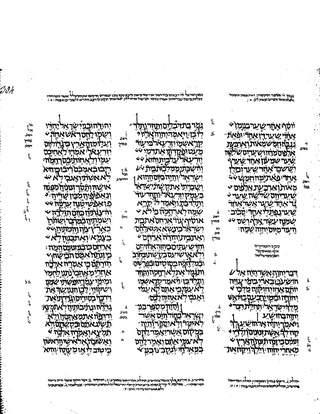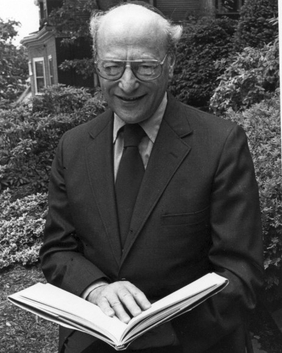
The Bible is a collection of religious texts or scriptures, some, all, or a variant of which are held to be sacred in Christianity, Judaism, Samaritanism, Islam, the Baha'i Faith, and other Abrahamic religions. The Bible is an anthology originally written in Hebrew, Aramaic, and Koine Greek. The texts include instructions, stories, poetry, prophecies, and other genres. The collection of materials that are accepted as part of the Bible by a particular religious tradition or community is called a biblical canon. Believers in the Bible generally consider it to be a product of divine inspiration, but the way they understand what that means and interpret the text varies.

The Book of Zephaniah is the ninth of the Twelve Minor Prophets of the Old Testament and Tanakh, preceded by the Book of Habakkuk and followed by the Book of Haggai. Zephaniah is a male given name that is usually interpreted to mean "Yahweh has hidden/protected," or "Yahweh hides". The church father Jerome of Stridon interpreted the name to mean "the watchman of the Lord". The original text of the prophecy was written in Biblical Hebrew.
The Book of Genesis is the first book of the Hebrew Bible and the Christian Old Testament. Its Hebrew name is the same as its first word, Bereshit. Genesis is an account of the creation of the world, the early history of humanity, and the origins of the Jewish people.

The Torah is the compilation of the first five books of the Hebrew Bible, namely the books of Genesis, Exodus, Leviticus, Numbers and Deuteronomy. The Torah is known as the Pentateuch or the Five Books of Moses by Christians. It is also known as the Written Torah in Rabbinical Jewish tradition. If meant for liturgic purposes, it takes the form of a Torah scroll. If in bound book form, it is called Chumash, and is usually printed with the rabbinic commentaries.

Abraham ben Meir Ibn Ezra was one of the most distinguished Jewish biblical commentators and philosophers of the Middle Ages. He was born in Tudela, Taifa of Zaragoza.
Biblical studies is the academic application of a set of diverse disciplines to the study of the Bible. For its theory and methods, the field draws on disciplines ranging from ancient history, historical criticism, philology, theology, textual criticism, literary criticism, historical backgrounds, mythology, and comparative religion.

Keturah was a wife and a concubine of the Biblical patriarch Abraham. According to the Book of Genesis, Abraham married Keturah after the death of his first wife, Sarah. Abraham and Keturah had six sons. According to Jewish tradition, she was a descendant of Noah's son Japheth.

The Tz'enah Ur'enah, also spelt Tsene-rene and Tseno Ureno, sometimes called the Women's Bible, is a Yiddish-language prose work whose structure parallels the weekly Torah portions and Haftarahs used in Jewish prayer services. The book was written by Jacob ben Isaac Ashkenazi (1550–1625) of Janów Lubelski, and mixes Biblical passages with teachings from Judaism's Oral Torah such as the Talmud's Aggadah and Midrash, which are sometimes called "parables, allegories, short stories, anecdotes, legends, and admonitions" by secular writers.
There are a number of passages in the Hebrew Bible and the New Testament that have been interpreted as involving same-sex sexual activity and relationships. The passages about homosexual individuals and sexual relations in the Hebrew Bible are found primarily in the Torah. The book of Leviticus chapter 20 is more comprehensive on matters of detestable sexual acts. Some texts included in the New Testament also reference homosexual individuals and sexual relations, such as the Gospel of Matthew, the Gospel of Luke, and Pauline epistles originally directed to the early Christian churches in Asia Minor. Both references in the Hebrew Bible and the New Testament have been interpreted as referring primarily to male homosexual individuals and sexual practices, though the term homosexual was never used as it was not coined until the 19th century.

Samuel David Luzzatto, also known by the Hebrew acronym Shadal, was an Italian-Austrian Jewish scholar, poet, and a member of the Wissenschaft des Judentums movement.

Thomas Lee Pangle, is an American political scientist. He holds the Joe R. Long Chair in Democratic Studies in the Department of Government and is Co-Director of the Thomas Jefferson Center for Core Texts and Ideas at the University of Texas at Austin. He has also taught at the University of Toronto and Yale University. He was a student of Leo Strauss.

Toledot, Toldot, Toldos, or Toldoth is the sixth weekly Torah portion in the annual Jewish cycle of Torah reading. The parashah tells of the conflict between Jacob and Esau, Isaac's passing off his wife Rebekah as his sister, and Isaac's blessing of his sons.
Hebrew Bible English translations are English translations of the Hebrew Bible (Tanakh) according to the Masoretic Text, in the traditional division and order of Torah, Nevi'im, and Ketuvim. Most Jewish translations appear in bilingual editions (Hebrew–English).
Soncino Press is a Jewish publishing company based in the United Kingdom that has published a variety of books of Jewish interest, most notably English translations and commentaries to the Talmud and Hebrew Bible. The Soncino Hebrew Bible and Talmud translations and commentaries were widely used in both Orthodox and Conservative synagogues until the advent of other translations beginning in the 1990s.
Jewish commentaries on the Bible are biblical commentaries of the Hebrew Bible from a Jewish perspective. Translations into Aramaic and English, and some universally accepted Jewish commentaries with notes on their method of approach and also some modern translations into English with notes are listed.

Nahum Mattathias Sarna was a modern biblical scholar who is best known for the study of Genesis and Exodus represented in his Understanding Genesis (1966) and in his contributions to the first two volumes of the JPS Torah Commentary (1989/91). He was also part of the translation team for the Kethuvim section of the Jewish Publication Society's translation of the Bible, known as New Jewish Publication Society of America Version.
George Howard Guthrie is an American biblical scholar who is Professor of New Testament at Regent College in Vancouver, British Columbia. Guthrie holds a Ph.D. in New Testament Studies and is considered to be one of the premier authorities in the United States on the Book of Hebrews in the New Testament. He has authored numerous articles and books. Guthrie was Guest Lecturer at The Bible Institute of South Africa's Winter School in July 2018.
David Bruce Hendin is an expert American numismatist specializing in ancient Jewish and Biblical coins and their archaeology. Throughout his career, Hendin has also been known as a medical journalist, newspaper columnist, publishing executive, literary agent, and author. Some of Hendin's books include Death as a Fact of Life and the reference Guide to Biblical Coins.

Harold Bloom was an American literary critic and the Sterling Professor of humanities at Yale University. In 2017, Bloom was called "probably the most famous literary critic in the English-speaking world". After publishing his first book in 1959, Bloom wrote more than 50 books, including over 40 books of literary criticism, several books discussing religion, and one novel. He edited hundreds of anthologies concerning numerous literary and philosophical figures for the Chelsea House publishing firm. Bloom's books have been translated into more than 40 languages. He was elected to the American Philosophical Society in 1995.
Joel Manuel Hoffman is an American scholar, writer, speaker, and novelist known for his criticism of the Christian fundamentalism's style of Biblical interpretation. He has served as a translator for the ten volume series of My People's Prayer Book.











